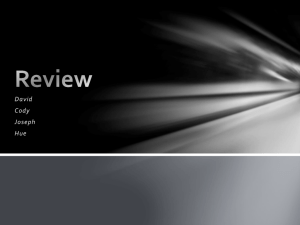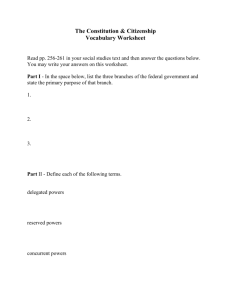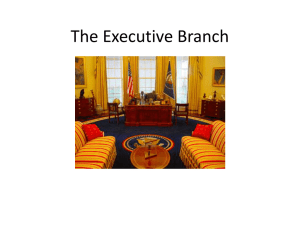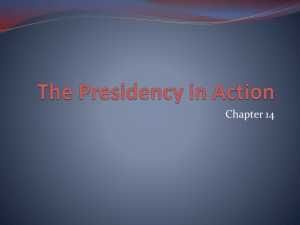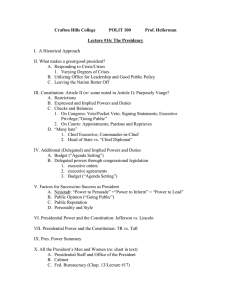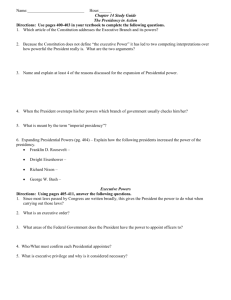www.XtremePapers.com Cambridge International Examinations 9697/31 Cambridge International Advanced Subsidiary and Advanced Level
advertisement
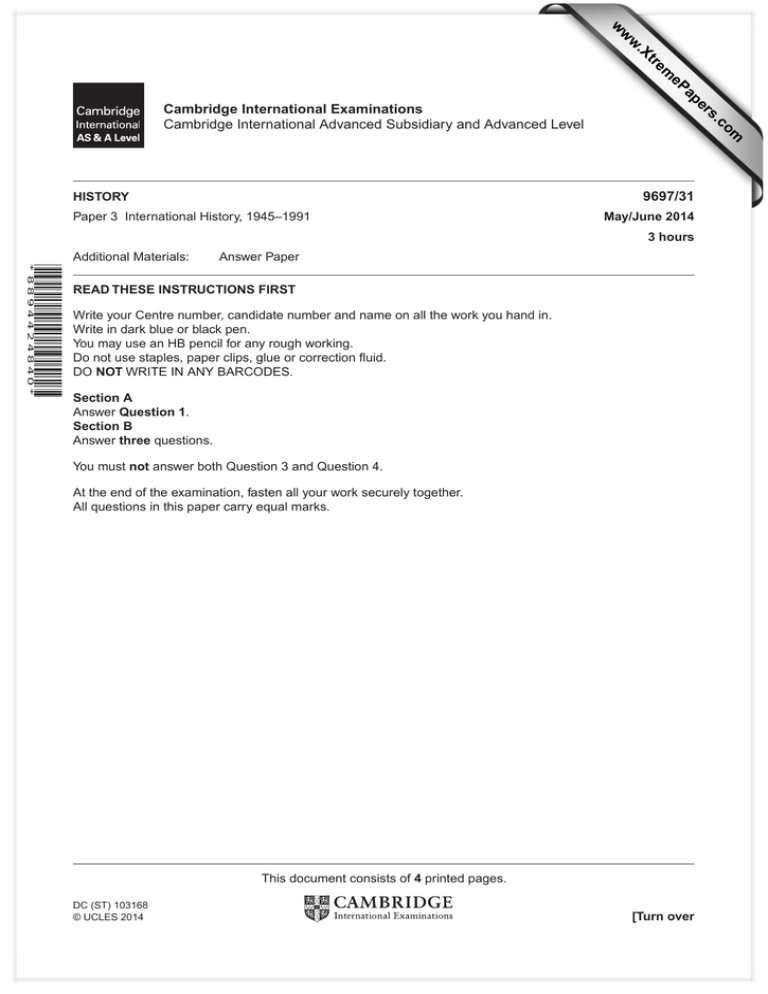
w w om .c s er 9697/31 HISTORY Paper 3 International History, 1945–1991 Additional Materials: ap eP m e tr .X w Cambridge International Examinations Cambridge International Advanced Subsidiary and Advanced Level May/June 2014 3 hours Answer Paper * 8 8 9 4 4 2 4 8 4 0 * READ THESE INSTRUCTIONS FIRST Write your Centre number, candidate number and name on all the work you hand in. Write in dark blue or black pen. You may use an HB pencil for any rough working. Do not use staples, paper clips, glue or correction fluid. DO NOT WRITE IN ANY BARCODES. Section A Answer Question 1. Section B Answer three questions. You must not answer both Question 3 and Question 4. At the end of the examination, fasten all your work securely together. All questions in this paper carry equal marks. This document consists of 4 printed pages. DC (ST) 103168 © UCLES 2014 [Turn over 2 Section A: The Development of the United Nations, 1945–1991 You must answer Question 1. THE UNITED NATIONS AND THE VETO POWERS OF THE PERMANENT MEMBERS OF THE UN SECURITY COUNCIL 1 Read the Sources, and then answer the question. When answering Question 1, candidates are advised to pay particular attention to the interpretation and evaluation of the Sources, both individually and as a group. Source A Yesterday, the Australian delegate, Dr Evatt, attempted to marshal world public opinion against the right of any one of the Big Five to veto peaceful settlement of international disputes. This audacious course of summoning the world press to hear the case against veto powers inevitably assigns him the role of chief defender of the small and middle powers against the Big Five. Dr Evatt said that ‘there is no possible justification for this veto’ adding that he believed the majority of the UN delegates shared this view. In reply, Mr Gromyko (USSR) said ‘the most essential factor in preserving future world peace is the preservation and strengthening of unity among the most powerful peace-loving nations. To remove the power of veto, political settlements by any great power would have undesirable consequences. The Russian view is that decisions not unanimously adopted might provoke friction between great powers which might lead to war.’ From an Australian newspaper’s coverage of the San Francisco Conference, May 1945. Source B Content removed due to copyright restrictions. From an article by a Danish foreign affairs commentator, November 1946. © UCLES 2014 9697/31/M/J/14 3 Source C At the San Francisco Conference, the great powers put forward the idea of creating a new world order based on freedom and equal rights for men and women of all nations. However, in the same breath, they excluded themselves from the universal application of these principles. They overruled the principle of equality and installed a veto right to shield their national interests from any obstructions. The great powers used their advantaged position to make permanent the status quo of 1945 in the UN Charter. The veto in the Security Council is a left-over from the poweroriented doctrine of international law of past centuries. The great powers defended their interests as indispensible for the maintenance of international peace. The great powers definitely would not have initiated the founding of the UN without the incorporation of the veto privilege into the Charter. Shortly after the foundation of the UN, former US Secretary of State Cordell Hull stated bluntly that ‘our government would not remain there a day without retaining the veto power.’ From an article on UN Security Council voting procedures, by an Austrian academic, 1991. Source D Roosevelt anticipated that smaller countries would fear the veto power of the permanent members and would probably dispute the draft UN Charter. The USA was able to develop its arguments on behalf of the veto well in advance of the San Francisco Conference. The USA argued that there simply was not going to be a viable UN organisation unless the most powerful nations received veto rights. None of these countries, the USA insisted, was otherwise going to entrust its sovereignty to an international group, especially not to a resurrected, intrusive and powerless League of Nationslike body. And, the USA added, the other nations in the UN would never have enough weapons or influence to enforce UN edicts on the great powers except by the agreement of the great powers themselves. Finally, even with an organisation that might distribute authority in a way that would seem unsatisfactory to lesser powers, the great powers would still always be answerable to world opinion. From an article by an American political commentator, 1994. Source E The privileged position which the Charter grants the five great powers in conferring upon each of them the veto right was justified by their ‘primary responsibilities’. In the discussions at the San Francisco Conference, great stress was laid upon these special responsibilities of the five great powers. The delegate from the Soviet Union admitted that the right of veto would put the permanent members of the Security Council in a special position, but pointed out that this corresponded to the responsibilities and duties that would be imposed upon them. The representative of Yugoslavia, in defending the proposed voting procedures, declared that ‘the responsibility of the permanent members far surpassed that of the non-permanent’. Even the Cuban representative, who was against the veto right of the permanent members of the Security Council, admitted that ‘the responsibility of the great powers surpassed that of the other powers.’ From a book entitled ‘The Law of the United Nations’, by a European academic, 2000. Now answer the following question. ‘The San Francisco Conference was justified in approving veto powers to the five permanent members of the Security Council.’ How far do Sources A–E support this view? © UCLES 2014 9697/31/M/J/14 [Turn over 4 Section B You must answer three questions from this section. You must not answer both Question 3 and Question 4. 2 ‘The Marshall Plan was simply an American reaction to Soviet expansionism in Eastern Europe.’ How far do you agree? 3 To what extent was the globalisation of the Cold War from 1950 to 1975 caused by the Soviet Union’s determination to spread its communist ideology? OR 4 ‘The Cuban Missile Crisis ended in victory for the USA and defeat for the USSR.’ How valid is this view of the crisis? 5 ‘Mikhail Gorbachev reformed too much; Deng Xiaoping reformed too little.’ How far does this explain why both the Soviet Union and China experienced a crisis of communism in the 1980s? 6 Did the SALT Treaties achieve anything substantial? 7 To what extent were the major problems which faced the international economy during the 1970s and early 1980s caused by the oil crises of 1973 and 1979? 8 ‘The Brandt Report said much but achieved little.’ Discuss. Copyright Acknowledgements: Question 1 Source A © The Argus ; Melbourne, Australia; 30 May 1945. Question 1 Source B © Erik Seidenfaden; The Right of Veto, ‘Veto-Retten’; Frit Danmark Vol.5, No.31; November 1946. Question 1 Source C© Hans Köchler; The Voting Procedure in the United Nations Security Council – Examining a Normative Contradiction in the UN Charter and its Consequences on International Relations; Vienna: International Progress Organization; 1991. Question 1 Source D © Stephen Schlesinger; FDR’s five policemen: creating the United Nations; World Policy Journal; 1994. Question 1 Source E © Hans Kelsen; The Law of the United Nations ; The London Institute of World Affairs, The Lawbook Exchange; 2000. Permission to reproduce items where third-party owned material protected by copyright is included has been sought and cleared where possible. Every reasonable effort has been made by the publisher (UCLES) to trace copyright holders, but if any items requiring clearance have unwittingly been included, the publisher will be pleased to make amends at the earliest possible opportunity. Cambridge International Examinations is part of the Cambridge Assessment Group. Cambridge Assessment is the brand name of University of Cambridge Local Examinations Syndicate (UCLES), which is itself a department of the University of Cambridge. © UCLES 2014 9697/31/M/J/14

